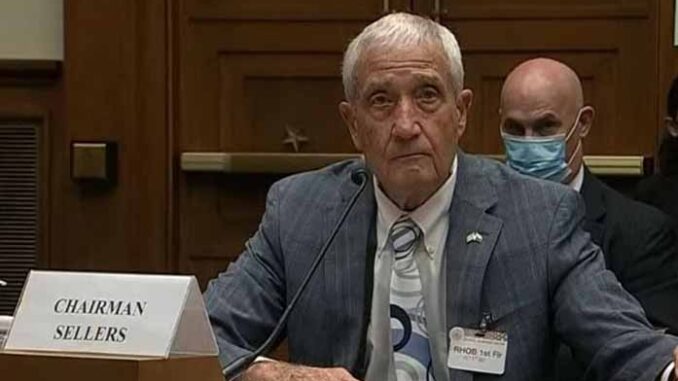
A scientist contracted by the Arizona Senate to assess one aspect of Maricopa County’s 2020 General Election was preparing an evidence packet for the Arizona Attorney General on Thursday at the same time a Congressional committee was hearing sworn testimony about the audit.
Dr. Shiva Ayyadurai told Arizona Daily Independent he was sending additional evidence to the attorney general’s election integrity unit related to Maricopa County’s early balloting process. He will also make himself available to investigators for any questions they have about the review he did for the Senate.
Until then, Ayyadurai has challenged Maricopa County officials to a public forum to review each of the questions and anomalies noted in his Sept. 24 about one phase of the county’s process for early balloting, also known as absentee or mail-in voting. More than 1.9 million of the county’s 2.1 million ballots were cast as mail-ins.
Mail-in voting was among several topics the U.S. House Oversight and Reform Committee discussed Thursday while addressing Maricopa County’s election and the audit the Arizona Senate undertook earlier this year.
Doug Logan, the CEO of audit contractor Cyber Ninjas, was invited by the committee to discuss his team’s findings, but Logan declined to appear. Instead, Ken Bennett, a former Arizona Senate President who served as the Senate’s Audit Liaison, flew to Washington D.C. to testify about his observations that some election laws and procedures appeared to have been not followed in Maricopa County,
Bennett, who also previously served as Arizona Secretary of State, fielded dozens of questions about his experience as the audit liaison.
Three of Arizona’s Congressmen, Reps. Andy Biggs, Paul Gosar, and Greg Stanton, sit on the Oversight Committee. In his opening comments, Biggs called out the hypocrisy of those who championed the fact the Cyber Ninjas’ audit report confirmed Joe Biden’s victory while they also claim such audits are an existential threat to democracy and undermine faith in election integrity.
Maricopa County’s board chairman, Jack Sellers, and vice chairman Bill Gates were also in Washington D.C. to testify under oath to the Oversight Committee. At one point in their testimony, the supervisors acknowledged to Biggs that some election-related files were intentionally removed from the county’s election management system. But instead of deleting the files as the Cyber Ninjas report alleges, the supervisors claim the files were simply archived to make room for new files.
As to why the county did not turn over those archive records or backup logs, county officials claim neither of the two Senate subpoenas specifically asked for those items, even though the subpoenas did ask for the data from its original location. That response made under oath caught the attention of Senate President Karen Fann.
“It was interesting to heat the Supervisors admit they deleted files and then purposely withheld that information from the Senate and the auditors,” Fann said. “Thank you Congressman Biggs for pushing for the truth.”
During the testimony, Gates told the committee he does not oppose election audits, but did have concerns with the Senate’s undertaking. As a result, the supervisors did not allow county employees to answer questions for the audit team nor be involved in any part of the audit process.
As a result, the five final audit reports provide findings based solely on the information available, a point county officials frequently argued to attack any suggestions that Maricopa County could have done better in some areas of the election. Or that there was intentional disregard for election laws or state election procedures.
That is one reason Thursday’s release of Maricopa County’s formal response to the audit reports has raised eyebrows. Comments in the response frequently fault the auditors for not understanding how county elections operate, but gloss over the fact that the only people who could have helped improve that understanding had in fact refused to cooperate.
Bennett spoke with Arizona Daily Independent while he was waiting for his flight back to Arizona on Thursday. He was saddened at the suggestion by members of Congress that he and others involved in the audit were somehow undermining democracy.
“It is my overall impression that there is a lot of passion regarding election integrity, and I believe there is nothing more important to our country,” Bennett said, adding that like Rep. Biggs, he found it “hypocritical” that opponents of the Senate’s audit readily accepted the hand count results but rejected any suggestions that the election was not run perfectly.
“They can’t have it both ways when obviously we found some things which need to be fixed in our elections in Arizona,” he said.
Ayyadurai has a similar reaction to those who cast doubt on the motives of others simply trying to get answers to how Maricopa County conducted the biggest election in its history. He also pushed back on those attempting to vilify anyone seeking to ensure election integrity.
On Oct. 6, Ayyadurai submitted a followup case study to Fann in which he noted that Congress passed a law 50 years ago that declared election audits to be a public good which helps guarantee the One Person, One Vote principle of democracy. He pointed out that his Sept. 24 report to the Senate has did not contain any claims, but rather findings and anomalies along with recommendations.
“Showing an anomalous pattern e.g. an unexpected pattern, and seeking explanations is what occurs in engineering,” he wrote. “The DNA of engineering is auditing, identifying anomalous behavior, reporting them, and resolving them. To take offense to this process is what raises ‘suspicions.’”
Watch my closing remarks in the House Oversight Committee's Hearing on the Arizona Audit. pic.twitter.com/NEZteFVmEv
— Rep Andy Biggs (@RepAndyBiggsAZ) October 7, 2021
